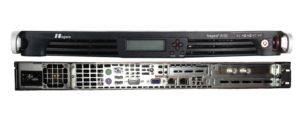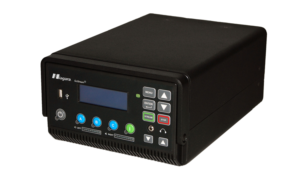A Quick Guide to Video Encoding
Any company hoping to capitalize on streaming content, live or not, needs a solid understanding of video encoding and related processes. Video encoding compresses raw video data into a smaller, more useable format. We’ve compiled this guide to provide insight into common encoding terminology and solutions available to businesses. This guide will provide business leaders and managers with a solid footing to begin streaming video in their operation.
This guide to encoding includes:
- All You Need to Know About Video Encoding – This section answers common questions about the nature of video encoding, why codecs are relevant, and some common methods and applications of video encoding.
- Understanding the Differences Between Video Encoding, Transcoding, and Decoding – Although some use these terms interchangeably, video encoding, transcoding, and decoding have important differences. In this section, we’ll discuss these processes and what they are used for.
- Video Encoder, Transcoder, and Decoder Options – We discuss Niagara Video’s premier encoding and transcoding solutions and how to choose the right one for your application.
All You Need to Know About Video Encoding
Newcomers to the concept of video encoding may not understand what it is or why it is important. Here are the basics:
What is Video Encoding?

Encoding is the process of compressing raw video —which contains a massive amount of data—into a smaller format. Live encoding decreases bandwidth when streaming live footage to ensure efficient transfer to viewers. File-based encoding is a part of a larger production workflow wherein a large, raw file is compressed into a more manageable file size for further processing or distribution.
While there are software packages for file-based encoding, dedicated encoding hardware is often the best solution for streaming purposes and for dedicated, low-latency file streaming.
What is a Codec?
A codec is the actual algorithm used to compress the raw video, then to decompress the file for streaming or file transfer. The algorithm contains a set of instructions that the encoder follows to decrease the file size, then reverses via a decoder or software player to allow the end-user to see the video. The most common codec is H.264 (AVC), although MPEG-2 and Windows Media remain in usage. H.265 (HEVC) and AV1 are growing but still have a ways to go. It is likely that there will be even more codecs in the future.
Understanding the Differences Between Video Encoding, Transcoding, and Decoding
The terminology surrounding video encoding processes can be confusing, especially since it is often used incorrectly.
Encoding vs. Transcoding
Even experts often use the terms encoding and transcoding interchangeably, but they aren’t the same process. Where encoding deals with compression of raw data, transcoding translates an existing video stream/file into a different format. In other words, transcoding re-encodes a previously encoded stream/file using a different set of rules. The distinction is subtle but important, especially for streaming.
Ideally, all viewers of a stream will be able to enjoy the same uninterrupted experience. This is not possible without a transcoder because viewers use different viewing platforms that support different file formats. Streaming content in only one format excludes viewers whose device or browser does not support that format. Transcoding converts less common video file types into more broadly used formats or offers streaming in multiple formats to include the largest number of viewers possible.
Encoding vs. Decoding
The difference between encoding and decoding is much more straightforward. Decoding is essentially the reverse of encoding. A decoder takes an encoded, compressed stream/file and decompresses it back into its raw form. Raw video data is required for editing processes and for viewing of the raw video.
Video Encoder, Transcoder, and Decoder Options
Niagara Video offers a full line of high-performance encoders and transcoders, including all-in-one units and portable options.
Rackmount Products
Rackmount products are premium, mounted products built for maximum performance and durability.

- 8000 Series Encoder & Transcoder. Based on reliable SCX encoding software, the 8000 series is a low cost-effective encoder, transcoder, and decoder unit with H.264 and HEVC based encoding and or transcoding.
- 8100 Series Encoder, Decoder & Transcoder. Based on reliable SCX encoding software, the 8100 series is our most cost-effective encoder, transcoder, and decoder unit with H.264 and HEVC based encoding and or transcoding.

- 9300 Series Encoder & Transcoder. The 9300 series is another of Niagara’s cost-effective multi-function platforms, offering support for H.264, MPEG-2, and HEVC based encoding, decoding, or transcoding, including record-to-file and play-from-file functions.

- 9100 Series Encoder. The 9100 series offers an impressive array of inputs, including SDI and analog sources, with support for older protocols such as Windows Media. The 9100 is an economical, input-dense option for professional live capture, encoding, and streaming.
Portable Products
For ultimate flexibility, Niagara also offers a range of portable encoding and transcoding options.
- GoStream Encoders. Niagara’s GoStream Encoders rank among our most popular options. GoStream portable encoders are efficient and reliable, offering both analog and digital input models with multiple output protocols. Their compact bodies are still equipped with high-end processing equipment and intuitive front-panel controls to ensure maximum performance wherever you are.
- GoStream B264 Broadcast Encoder & Decoder. The B264is a flexible and affordable option for professional first mile and backhaul applications, including broadcast and IP transport. The GoStream unit now features Reliable Internet Streaming Transport (RIST), including support for two other common internet transfer protocols: HLS Server and RTMP (Adobe Flash), as well as traditional UDP and RTP.
Our most compact options come from the GoStream Mini line, all of which are feature-rich, lightweight, and energy-efficient for optimal performance on-the-go.
Finally, at half the size of a rackmount encoder, the 2200 series encoder is designed to balance portability with quality.
- 8000N and GoStream Ideal for AT&T U-verse, corporate, government, educational, and house of worship applications, these encoders come complete with a 500 GB SSD and a built-in web interface for simple set-up and streaming from anywhere. Supported formats include Flash, Windows Media, MPEG-2, and MPEG-4.
Choosing the Best Video Encoding Solution
If you plan to offer more than occasional streaming or on-demand video, you’ll want to invest in a dedicated hardware solution or a reliable software based solution that can keep up with projected volumes and offer 24 by 7 usage. However, there are many factors involved in selecting the right system for your needs.
The first question to ask is whether the encoder needs to be portable or highly compact. If this is the case, the GoStream or GoStream Mini lines pack reliable performance into a small chassis.
If size or portability aren’t relevant, our rackmount products offer the highest available performance. Some factors that might help you choose between rack-mounted options include:
- Price. Although all Niagara units are competitively priced, prices between models vary based on capabilities to ensure we have a solution for all budgets.
- Versatility. Many of our units are all-in-one, encoder/decoder units. This can save money and time for clients who regularly perform both processes.
- Compatibility. If workflow depends on a certain codec or file format, be sure to select an encoder that supports that requirement.
- Application. Depending on the size of the audience, some broadcasting clients may need higher performance capabilities than those operating smaller live streams.
Start Streaming Today With Niagara Video Solutions
Niagara Video proudly serves some of the largest network broadcasting clients in the world alongside smaller venues. For over two decades, our products have stood for reliability and quality, and we’ve built a name for ourselves based on that commitment. No matter your streaming application, Niagara Video Corporation offers the best dedicated hardware to improve your stream quality and optimize your team’s efficiency.
For more information about our video encoding, transcoding, and decoding products, please contact Niagara Video today.